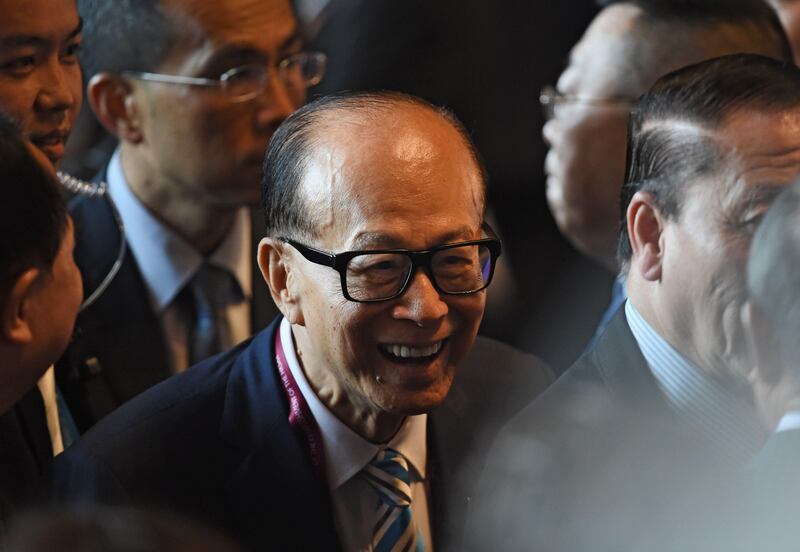In the mid-1970s, bored with interviewing the Eton-educated British taipans who basically owned Hong Kong, I took the Star Ferry across to Kowloon to meet some emerging Chinese businessmen.
Someone had given me a list of aspiring young entrepreneurs who he forecast would soon eclipse the big “hongs” such as the conglomerates Jardine Matheson, Swires and multinationals Wheelock Marden and Hutchison, and I wanted to interview them.
Kowloon was a world away from the shiny, air-conditioned towers of the Central district, with its cricket pitch and the colonial-style Hong Kong Club and I found myself in a hot, steamy factory sitting opposite a man called Li Ka-shing. Through an interpreter, he told me how he arrived to Hong Kong as a penniless young immigrant from Communist China, worked in all sorts of sweat shops and in the 1950s saved and borrowed enough to start his own factory. He had, he explained, learned the technique of mixing colour with plastics to resemble real flowers and found an enormous world-wide demand for them.
When I saw him he had decided that plastic flowers were already out and property was where he wanted to be. When others were fleeing for cover (Jardine moved its domicile overseas) he had taken advantage of a crash in Hong Kong, caused by the spillover of unrest from the Cultural Revolution, to begin buying up properties just before one of the biggest property booms the world has ever seen. No one knew where his money came from, but there were rumours he was close to Deng Xiaoping, chairman Mao’s successor – which turned out to be true a few years later when he became one of the first foreign developers to enter China where he made a very large fortune.
Today, Hong Kong property is the one the most expensive in the world and Mr Li is the world's 18th richest man with a fortune of US$33bn. Known by the local media as "Superman" and on Wall Street as "Asia's Warren Buffett", he has long eclipsed the British taipans; the Keswicks, who control Jardines, to rank No 36 in The Sunday Times Rich List with a personal £3bn (Dh14.2bn) and the Swires at 50 with £2.2bn. And they bought their properties, most of which they still own, in 1901.
My abiding memory of that first meeting is of him carefully setting his Casio electronic watch, which had lots of buttons and dials, to time our interview. Exactly 30 minutes later, it pinged, he stood up, shook my hand and I exited as I had come, through the steamy factory floor where hundreds of Chinese workers were assembling plastic flowers and toys ready for shipping to the US and Europe.
At dinner that evening back in Hong Kong, the chairman of one of the “hongs” asked me how I had got on with Mr Li and the other aspiring Chinese businessmen. Grand as he was, there was no hiding his concern. He was the past, Mr Li was the future – as demonstrated a few years later with Mr Li's daring acquisition of Hutchison, the colony’s second-biggest British colonial trading company. Within a few years almost every one of those hongs was threatened with a hostile takeover.
The next time I saw Mr Li he was on the 70th floor of his downtown headquarters in Central which, of course, he owned. Now he spoke much better English but still wore the same watch (I read recently that he has still got it) – and still gave me exactly half an hour. Over the intervening years, he had moved into mobile phones and utilities and today has interests all over the world: ports; telecoms; banking; retail; and huge property holdings in Vancouver, Australia, the UK – and China of course, although he is said to be no fan of the current president, Xi Jinping.
Mr Li was in the news this week as the backer of a British start-up that uses artificial intelligence to transcribe audio files (particularly useful for journalists who have to transcribe long interviews). But The Wall Street Journal recently revealed that he has "told associates" that he plans to step down as chairman of his global conglomerate Cheung Kong next year when he turns 90.
The WSJ quoted "sources" as saying Mr Li's "mind remains sharp" but he suffers from a bad back, is definitely slowing down and is passing on the reins to his son Victor. And he has lost his claim to being China's richest man, which mattered to him, as Jack Ma of Alibaba and the property magnate Wang Jianlin of Dalian Wanda have seen their fortunes boom in recent years.
I still see him peering over his iconic horn-rimmed glasses in Kowloon, fiddling with his electronic watch and clearly itching to get on with his next deal. I don’t suppose he has changed that much.






